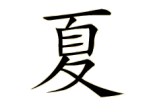Chinese history – Xia Dynasty

The Xia dynasty has never been definitively proven historically, although excavations have revealed signs of a ruling dynasty dating back to the 21st century B.C.E. For example, bronze vessels were found in Erlitou (northern China) in 1975. Inscriptions indicated a culture predating the Shang dynasty. Traditions and histories regarding the Xia dynasty were first written down around one thousand years after its end.
Little is known of the Xia dynasty. Transmission of authority was based upon paternal succession, of which evidence appears in stories about the legendary rulers of primitive times. Succession was allegedly introduced with the son of the Xia dynasty’s first king, King Yu. He seized rule even though his father had named another successor. Confucius describes the kingship in which the king chose a worthy heir as the best form of rule, so it makes sense that the ruler who eliminated that practice would be viewed as a usurper. The culture had a calendar, sacrificial rites, and highly-developed agriculture. The first written accounts of the Xia dynasty date from a thousand years after its putative existence.
The last ruler of the Xia dynasty is described as a brutal sovereign. He lost the “mandate of heaven,†which passed to the next dynasty. By depicting the previous rulers as especially brutal and cruel, the following dynasty could legitimate overthrowing the “son of heaven,†who served as intermediary between humans and heaven. This representation runs through almost the totality of Chinese historiography. Women played an inglorious role during the downfall of a dynasty.
Demise of the Xia dynasty
Meixi was brought to the court of King Jie and incorporated into his harem. She was self-confident and did not fit in among the other women of the court, who behaved as their upbringing demanded: well-mannered and obsequiously. Meixi descended from a barbarian tribe, which naturally attracted the king’s attention. Thus she began to weave her spell around him.
Together, they sought more elaborate and cruel pleasures, allegedly including a “mountain of meat†and a “sea of wine†built by their slaves. Their servants had to climb into the sea and drink until they perished, while the king and Meixi observed the spectacle.
Neglecting the affairs of state led to Jie’s overthrow by King Tang. The soldiers of the Xia dynasty refused to defend their King Jie; he and Meixi were abandoned in a boat and engulfed by the sky. King Tang became the first king of the Shang dynasty.



Recommend this article